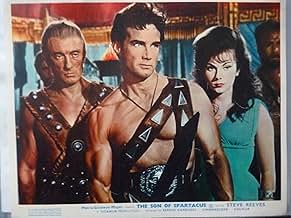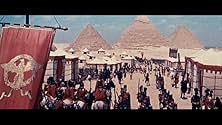CALIFICACIÓN DE IMDb
5.9/10
662
TU CALIFICACIÓN
Agrega una trama en tu idiomaDuring the power struggle between Caesar and Crassus, a Roman centurion, who is the lost son of Spartacus, is dispatched to Crassus' camp to observe his movements and keep Caesar informed.During the power struggle between Caesar and Crassus, a Roman centurion, who is the lost son of Spartacus, is dispatched to Crassus' camp to observe his movements and keep Caesar informed.During the power struggle between Caesar and Crassus, a Roman centurion, who is the lost son of Spartacus, is dispatched to Crassus' camp to observe his movements and keep Caesar informed.
- Dirección
- Guionistas
- Elenco
Ahmed Ramzy
- Murdok - a Lybian Chief
- (as Ahmad Ramzi)
Abdulmuniem Abdulrahman
- Slave
- (sin créditos)
Hussein Al-Meliguy
- Slave
- (sin créditos)
Abdel Hameed Badawy
- Slave
- (sin créditos)
Ala Badruddin
- Rebel Slave
- (sin créditos)
Opiniones destacadas
This film, made at the twilight of Mr. Reeves film career, is certainly one of his best. The location work in Egypt and a rather big budget look add a great amount of, shall I say it?, realism to an essentially escapist, fantastical genre- the Italian sword and sandal flicks of the 1958-64 period. This picture also features some extremely diabolical villainy on the part of Crassus. Sir Laurence Olivier wasn't nearly this outrageously evil playing the same character in SPARTACUS! Steve's dilemma is pretty heavy in this one, doing a complete 180 from up and coming Roman centurions to advocate warrior of the freedom movement for the slaves of Rome. The action scenes stand up pretty well after 40 plus years.
From Sergio Corbucci, director of the classic spaghetti westerns "The Great Silence" and "Django," comes a routine, but serviceable Italian sword-and-sandal epic staring Steve Reeves, best know for his many Hercules films. This was Reeves final on-screen appearance in this particular genre, later moving onto pirate and western films. "The Slave" has Reeves cast a Roman soldier who discovers he's actually the son of Spartacus, a slave turned gladiator turned rebel leader against the Roman Empire. Like his father, Reeves ends up leading a slave revolt. Unlike the Stanley Kubrick version of Spartacus, this film is minus interesting characters, dialogue, and narrative. However, Corbucci does bring strong visuals to the film and the production values of "The Slave" is better than most Italian sword-and-sandal pictures, which makes this film worth checking out for fans of these admittedly silly films.
10jimm-8
By 1970 Son of Spartacus (now out on DVD) found itself relegated to Saturday morning matinées, which is hardly surprising since Steve Reeves here seems to be getting twice as much combat duty as in most of the other Italian epics. So much so, one could hardly miss the kiddies re-enacting his many sword fights on the way home. Grown-ups too had something to admire, especially the eye-catching Ombretta Colli who conveniently gets shipwrecked with Reeves on a beach with her costume cut to shreds. This might prove an embarrassment to Miss Colli in later years when she went into Italian politics, no doubt hoping her voters would not remember her cheesecake days.
However, it is film music fans who have most to cheer, with a score derived from no less than three of the top Italian film composers. While Son of Spartacus was being filmed in Egypt during March and April of 1962, veteran maestro Carlo Innocenzi sadly died (on March 24). His stirring main title can still be heard in the M-G-M release, and it's an impressive full orchestral version of the slow execution march for Princess Elea in Goliath Against the Giants (1961). For the opening scenes M-G-M simply recycle Innocenzi's battle music from Goliath Against the Giants, but the opening narration is accompanied by the lovely "Glauco e Antonino" track from Lavagnino's Last Days of Pompeii (1959). For the rest of the score we get a mixture of new music by Piero Piccioni (a haunting desert tune and a rousing finale march when Reeves ultimately triumphs), plus some prior Piccioni material from Duel of the Titans (1961). The Italian language version (also available on DVD) is scored by Piccioni throughout, with a different main title adapted from "Amulio" in Duel of the Titans. Piccioni's entire score, including some unused cues, can be enjoyed on a CD thanks to those dedicated vault raiders at Digitmovies
However, it is film music fans who have most to cheer, with a score derived from no less than three of the top Italian film composers. While Son of Spartacus was being filmed in Egypt during March and April of 1962, veteran maestro Carlo Innocenzi sadly died (on March 24). His stirring main title can still be heard in the M-G-M release, and it's an impressive full orchestral version of the slow execution march for Princess Elea in Goliath Against the Giants (1961). For the opening scenes M-G-M simply recycle Innocenzi's battle music from Goliath Against the Giants, but the opening narration is accompanied by the lovely "Glauco e Antonino" track from Lavagnino's Last Days of Pompeii (1959). For the rest of the score we get a mixture of new music by Piero Piccioni (a haunting desert tune and a rousing finale march when Reeves ultimately triumphs), plus some prior Piccioni material from Duel of the Titans (1961). The Italian language version (also available on DVD) is scored by Piccioni throughout, with a different main title adapted from "Amulio" in Duel of the Titans. Piccioni's entire score, including some unused cues, can be enjoyed on a CD thanks to those dedicated vault raiders at Digitmovies
After the international success of HERCULES, the Steve Reeves Swords-and-Sandals vehicle THE SLAVE clearly had some money spent on its production values -- good costumes and some nice sets to accent good camera lighting abound. The plot, typical of peplum movies, is a mishmosh of themes intended to take advantage of recent hits.
Reeves is a Roman centurion working for the noble Julius Caesar in Rome. He is captured by leopard-skin wearing desert barbarians working for the evil Crassus, escapes, gets captured again, is enslaved, identified as Spartacus' son (hence the movie's Italian title) and leads a slave rebellion.
Director Sergio Corbucci does his usual highly competent job, abetted by the handsome production values that Cinecitta was capable of; kudos especially to director of Photography Enzo Baroni, whose lighting suggests illustrations on parchment. Although the writing never rises above the level of silliness that such cheap epics aspired to, fans of the genre will find plenty to enjoy.
Reeves is a Roman centurion working for the noble Julius Caesar in Rome. He is captured by leopard-skin wearing desert barbarians working for the evil Crassus, escapes, gets captured again, is enslaved, identified as Spartacus' son (hence the movie's Italian title) and leads a slave rebellion.
Director Sergio Corbucci does his usual highly competent job, abetted by the handsome production values that Cinecitta was capable of; kudos especially to director of Photography Enzo Baroni, whose lighting suggests illustrations on parchment. Although the writing never rises above the level of silliness that such cheap epics aspired to, fans of the genre will find plenty to enjoy.
Steve Reeves plays a high-ranking Roman centurion who finds out he's the son of the infamous rebel slave leader and spearheads a revolt, of course, in one of the better "sword & sandal" entries. Mixing the backstory of Moses (instead of a swaddling cloth, an amulet gives him away) with the exploits of a comic book superhero (Reeves sneaks off every now and then to shuck his tunic for dad's face-covering armor), director Corbucci took the tale and ran with it, producing some impressive mise-en-scène amidst his unexpectedly inventive camera-work. Gianna Maria Canale as Crassus' cougar wife does little more than lounge around on divans and ogle our hero but no matter, it's always a pleasure to see her in peplum like this.
¿Sabías que…?
- TriviaThis marked the final Italian sword and sandal/mythological muscleman movie to be made by Steve Reeves. He would make several "Sandokan" movies and a spaghetti western before retiring from the screen.
- ErroresThe story takes place during the triumvirate of Crassus, Caesar and Pompey (65-60 BC), but when Crassus talks with Verulus and Randus, with the Sphinx serving as background, it is plain that the monument has already lost its nose - a fact that would take place 1850 years later.
- Citas
La schiava Seila: [to Randus] My friend, my life... is you - my love!
- Versiones alternativasThe Italian theatrical version had a 101 minute running time, with minor censorship cuts for violence. The foreign versions, namely the UK (Son of Spartacus), the USA (The Slave), the German (Der Sohn des Spartakus), and the Finish, run over 102 minutes. Although unconfirmed, there are video versions in Italy and France cut to 97 or 95 minutes.
- ConexionesFeatured in Cheezy Fantasy Trailers (2006)
Selecciones populares
Inicia sesión para calificar y agrega a la lista de videos para obtener recomendaciones personalizadas
- How long is The Slave?Con tecnología de Alexa
Detalles
- Tiempo de ejecución1 hora 40 minutos
- Relación de aspecto
- 2.35 : 1
Contribuir a esta página
Sugiere una edición o agrega el contenido que falta

Principales brechas de datos
By what name was El hijo de Espartaco (1962) officially released in India in English?
Responda





























